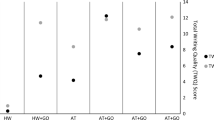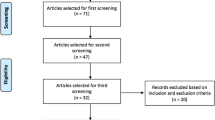Abstract
In addition to the impaired ability to effectively communicate, adults with acquired brain injury (ABI) also experience high incidences of depression, social isolation, and decreased quality of life. Expressive writing programs have been shown to be effective in alleviating these concomitant impairments in other populations including incarcerated inmates (Lane, Writing as a road to self-discovery, F & W, Cincinnati 1993). In addition, computer applications such as email have been suggested as an effective means of improving communication and social isolation in adults with brain injury (Sohlberg et al. [2003]. Brain Injury, 17(7), 609–629). This investigation examines the effects of on-line expressive journal writing on the communication, emotional status, social integration and quality of life of individuals with brain injury.
Similar content being viewed by others
References
Beck A.T., Steer R.A., Brown G.K. (1996). Beck depression inventory. San Antonio, The Psychological Corporation
Brown M., Vandergoot D. (1998). Quality of life for individuals with traumatic brain injury: Comparison with others in the community. Journal of Head Trauma Rehabilitation 13, 1–21
Center for Disease Control and Prevention. (2001). Prevalence of disabilities and associated health conditions among adults: United States, 1999. MMWR, 50, 120–125.
Fleminger S., Oliver D.L., Williams W., Evans J. (2003). The neuropsychiatry of depression after brain injury. Neuropsychological Rehabilitation, 13(1–2): 65–87
Galski T., Tompkins C., Johnston M.V. (1998). Competence in discourse as a measure of social integration and quality of life in persons with traumatic brain injury. Brain Injury 12(9): 769–782
Glenn M.B., Goldstein R., Selleck E.A., Rotman M. (2004). Characteristics of facility-based community integration programs for people with brain injury. Journal of Head Trauma Rehabilitation 19(6): 482–493
Glenn M.B., O’Neil-Pirozzi T., Goldstein R., Burke D., Jacob L. (2001). Depression amongst outpatients with traumatic brain injury. Brain Injury 15(9): 811–818
Green A., Felmingham K., Baguley I.J., Slewa-Younan S., Simpson S. (2001). The clinical utility of the Beck Depression Inventory after traumatic brain injury. Brain Injury 15(12): 1021–1028
Helfgott D., Westhaver M. (2005). Inspiration: Version 7.6. Portland, Inspiration Software, Inc
Helm-Estabrooks N., Hotz G. (1991). Brief test of head injury. Chicago, ProEd
Kreutzer J.S., Seel R.T., Gourley E. (2001). The prevalence and symptom rates of depression after traumatic brain injury: A comprehensive examination. Brain Injury 15(7): 563–576
Lane, B. (1993). Writing as a road to self-discovery. Cincinnati: F & W.
Lezak M.D., O’brien K.P. (1998). Longitudinal study of emotional, social and physical changes after traumatic brain injury. Journal of Learning Disability 21, 456–463
Polacco P. (1994). Pink and say. New York, Philomel Books
Silverstein S. (1969). The giving tree. New York, Harper Collins
Sohlberg M.M., Ehlhardt L.A., Fickas S., Sutcliffe A. (2003). A pilot study exploring electronic (or e-mail) mail in users with acquired cognitive-linguistic impairments. Brain Injury 17(7): 609–629
Todis B., Sohlberg M.M., Hood D., Fickas S. (2005). Making electronic mail accessible: Perspectives of people with acquired cognitive impairments, caregivers and professionals. Brain Injury, 19(6): 389–401
Uomoto J.M. (2004). The contribution of the neuropsychological evaluation to traumatic brain injury rehabilitation. In: Ashley M.J. (ed). Traumatic brain injury: Rehabilitative treatment and case management. Boca Raton, CRC Press, pp. 581–611
Willer B., Rosenthal M., Griffith E.R., Bond M.R., Miller J.D., Kreutzer J. (1993). Assessment of community integration following rehabilitation for traumatic brain injury. Journal of Head Trauma Rehabilitation 8, 75–87
Author information
Authors and Affiliations
Corresponding author
Rights and permissions
About this article
Cite this article
Fraas, M., Balz, M.A. Expressive Electronic Journal Writing: Freedom of Communication for Survivors of Acquired Brain Injury. J Psycholinguist Res 37, 115–124 (2008). https://doi.org/10.1007/s10936-007-9062-y
Published:
Issue Date:
DOI: https://doi.org/10.1007/s10936-007-9062-y




